
Now that the Houston Texans have settled out of court with 30 women who accused their former quarterback, Deshaun Watson, of sexual harassment and assault, the only moral thing left for the NFL to do is to punish the team.
Expecting the NFL to do the moral thing, especially as it relates to disciplining one of its teams as opposed to a lowly player is like leaving bowl of ice cream in a room with a toddler and not expecting there to be a mess 10 minutes later. There’s absolutely no reason to believe that will actually happen. That doesn’t mean that the Texans’ role in the Deshaun Watson mess should be ignored.
What was that role and why should a team be punished for what a player who’s no longer on their roster allegedly did? If you’ve been reading this space for the past few months (or at least turning on your TV once a week), you know that Watson was sued by two dozen women massage therapists who claimed that he did everything from expose himself during massage sessions to touch them with his penis and ejaculate while he was receiving treatment. Watson was investigated criminally with no charges being brought against him, and he reached undisclosed settlements with all but two of his accusers last month.
With most of his legal drama locked up behind those settlements, Watson is just waiting to hear how much of a punishment he’ll get from the NFL. The league wants an indefinite suspension, which would mean he wouldn’t be eligible to suit up for his new team, the Cleveland Browns, for at least a year.
Watson will likely be suspended because the NFL has a collectively-bargained procedure in place for doling out punishments to players even when those players haven’t been charged of a crime. I’m mostly fine with that, because guilty-beyond-reasonable-doubt is a ridiculously high bar for accountability, for sexual assault or harassment, charges that more often than not go unreported, let alone punished. Despite the protestations of folks who are still defending the likes of Bill Cosby and R. Kelly, most of us wouldn’t still be employed and making millions while under investigation for dozens of such accusations. At minimum, our employers would suspend us and in most cases we’d be canned without making a headline in the local news.
But what if it came out that our employers were in on the thing we were accused of? Why should they avoid accountability, in a courtroom or otherwise, if we can’t? That’s the question here with the Texans. The New York Times reported on June 8 that the Texans were not only aware of Watson’s propensity for scheduling massages with therapists who weren’t on the team’s medical staff, but that it also provided him with a non-disclosure agreement to have those off-the-books therapists sign. The Texans also paid for Watson’s membership to a private hotel-club where some of the alleged misconduct took place.
It wasn’t long after that report that the attorney for the plaintiffs against Watson, Tony Buzbee, said he planned on suing the team as well. On June 27, that lawsuit dropped. Less than two weeks later, the Texans settled. The team has never denied that it provided its former star signal caller with the boilerplate nondisclosure agreement or that it paid for Watson’s membership at the location where he got rubbed down so often. That’s less than we can say for Watson, who at least has continually denied that he did anything wrong, despite the prospect of losing yet another year of his career (he sat out all of the 2021 season).
The NFL claims that it holds its owners and front offices to a higher standard than it does individual players. It should, because institutions hold more power than employees, even when those employees are the most famous and talented people in an organization. Institutions can intervene when they know there’s a problem with one of their best employees, and when they fail to do so—or they act in a way that further enables the behavior that employee is accused of—then its time for accountability to be spread beyond the just suspending or exiling an individual accused of wrongdoing.
If you disagree with that, think about how much might change if police departments and police unions were actually held accountable for abusive cops’ actions rather than continually being allowed to hide behind the “few bad apples” excuse for their organizationally rotten cultures.
I won’t hold my breath for that to happen anytime soon, so I won’t expect much in the way of discipline from the NFL for the Texans, either. But if Deshaun Watson is about to lose at least another year of his career—and I’m OK with it if he does—the Texans shouldn’t go unscathed.

